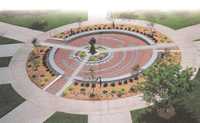
Dorothy Owen McGinn
is honored with a Brick from Carleen Currier.
Women have endured great hardship to help build this nation and are truly unsung heroines. My mother is one of those women.
Dorothy E. Owen McGinn was born in Eastern Colorado on January 15, 1931. Her family had settled there after traveling by wagon and train from Missouri. Her family's connection with the history of the Old West ranges from maternal grandparents who were Cherokee Indians to a paternal grandfather named for Jesse James, who occasionally dined with her great-grandparents.
Life wasn't easy on the plains of Eastern Colorado. Her parents were very poor and twice, once when she was in fifth grade and again when she was in eighth grade, she contracted rheumatic fever. There was no cure for rheumatic fever, and she was bedridden for a year each time. The excruciating pain she endured left her with temporary deformities: her mouth was pulled up at one corner, one leg became shorter than the other, and she sustained a severely damaged heart. Her mouth and leg eventually returned to normal, although her heart remains severely damaged. Because of her superior academic performance in previous years, the school administrators did not require her to make up the two years she was bedridden, and she was able to graduate with her class.
The outbreak of World War II had an impact on her life as well. German prisoners-of-war were incarcerated near her home and were required to work in the fields. As a teenager, she had to take meals out to the POWs working on her parents' farm and became acquainted with many of these young soldiers. She grew to have compassion for these young men who were far from home and not so very different from their American counterparts. This compassion has continued throughout her life. One of her most defining qualities is her empathy for others.
She was so influenced by the war that, upon graduation, she decided to enlist in the WAVES to become a nurse. Upon her arrival at the Induction Center in Denver, however, she broke her ankle while exiting the bus and the WAVES would not allow her to enlist. Still determined to become a nurse, she enrolled in nursing school in Halstead, Kansas, where she met my father and fell in love. She put her dream of becoming a nurse on hold to marry my father, moved to the farm in Sedgwick where she still makes her home, and devoted herself to raising three daughters.
In 1967, when my youngest sister entered school, my mother decided to return to nurse's training. She attended school while continuing to take care of her family, and became a Registered Nurse in the spring of 1969. After working several years as an RN and as a Nursing Supervisor, Mom returned to school to begin work on her Bachelor's degree. She continued to work full-time, cared for her home and family, and took evening classes until she earned her Bachelor of Science degree in Nursing.
The farm crisis of the 1980s had a profound effect on my parents. They, along with many of their peers, were in jeopardy of losing the family farm. Both of my parents refused to capitulate and worked two jobs trying to save the farm. For years, Mom worked two full-time nursing jobs, working seven days a week, sometimes sixteen hours per day,
What seemed like the final straw occurred in July, 1993. My parents had gone to Colorado to bring my ailing grandmother back to live with them. During their 24-hour absence, torrential rains hit this area. Their house, situated on a bank of the Little Arkansas River and surrounded by a dike, was inundated by the ensuing floodwaters. The force of the floodwaters was massive, pushing their home off its foundation and destroying everything they owned. The floodwaters also destroyed the crops.
My parents continued to struggle, refusing to give up. The stress was overwhelming, causing my father's death in 1995. Since his death, my mother has continued to work two full-time jobs and run the farm.
Despite the near-impossible hurdles she has had to overcome, my mother has remained a compassionate and giving person. While sifting through the flood-ravaged remains of her personal possessions, my sisters and I came across many notes written to her by former patients, thanking her for kind acts that ranged from providing them with needed toiletries to purchasing bus transportation home from the hospital for patients who could not afford it. The day before Christmas this past year, she learned of a coworker who could not afford to buy any Christmas presents for her three children. My mother quietly provided Christmas for these children, even though she had only casually known their mother for a few weeks.
My mother embodies the spirit of Pilgrim and pioneer women. She has endured great hardship and challenge, persevering through sheer determination and courage.
September 5, 1998










